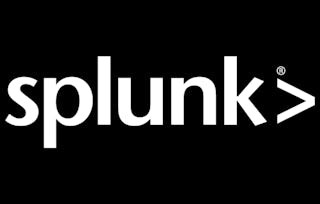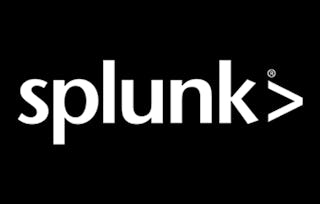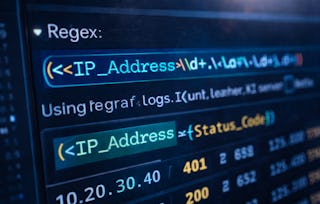This course will introduce you to the basics of machine data, Splunk’s architecture, and how to navigate the Splunk Web interface. You will gain fundamental knowledge for defining, creating, and using fields in searches. You will learn about the different types of knowledge objects and how to create knowledge objects including event types, workflow actions, tags, aliases, search macros, and calculated fields.

Splunk Knowledge Manager 101

Splunk Knowledge Manager 101
This course is part of Splunk Knowledge Manager Specialization

Instructor: Splunk Instructor
2,836 already enrolled
Included with
26 reviews
What you'll learn
Gain foundational knowledge about machine data and learn how Splunk leverages operational intelligence.
Investigate data using Splunk Search Processing Language (SPL) and create searches, reports, dashboards, and visualizations.
Identify how fields from lookups, calculated fields, field aliases, and field extractions enrich data.
Learn the purpose of knowledge objects and how they can be used to enhance the search process.
Skills you'll gain
- Business Analytics
- Data Management
- Big Data
- Incident Management
- Data Analysis
- Data Modeling
- Data Processing
- Splunk
- Dashboard
- Business Intelligence
- Event Monitoring
- Query Languages
- Information Management
- Skills section collapsed. Showing 12 of 13 skills.
Details to know

Add to your LinkedIn profile
4 assignments
See how employees at top companies are mastering in-demand skills

Build your subject-matter expertise
- Learn new concepts from industry experts
- Gain a foundational understanding of a subject or tool
- Develop job-relevant skills with hands-on projects
- Earn a shareable career certificate

There are 5 modules in this course
This eLearning module introduces students to what machine data is, and how Splunk can leverage operational intelligence to investigate and respond to incidents in their organizations.
What's included
3 videos2 readings
This eLearning module teaches students how to use Splunk to create reports and dashboards and explore events using Splunk's Search Processing Language. Students will learn the basics of Splunk's architecture, user roles, and how to navigate the Splunk Web interface to create robust searches, reports, visualizations, and dashboards..
What's included
8 videos2 readings1 assignment
This module is for users who want to learn about fields and how to use fields in searches. Topics will focus on explaining the role of fields in searches, field discovery, using fields in searches, and the difference between persistent and temporary fields. The last topic will introduce how fields from other data sources can be used to enrich search results.
What's included
5 videos3 readings1 assignment
This eLearning module teaches students about how different types of knowledge objects to extract additional insights from your data. Students will learn the basics of how to create knowledge objects, define their settings, edit, and manage existing knowledge objects.
What's included
3 videos2 readings1 assignment
This module is for knowledge managers who want to learn how to create knowledge objects for their search environment using the Splunk web interface. Topics will cover types of knowledge objects, the search-time operation sequence, and the processes for creating event types, workflow actions, tags, aliases, search macros, and calculated fields.
What's included
8 videos2 readings1 assignment
Earn a career certificate
Add this credential to your LinkedIn profile, resume, or CV. Share it on social media and in your performance review.
Instructor

Offered by
Explore more from Security
 Status: Free Trial
Status: Free TrialSplunk Inc.
 Status: Free Trial
Status: Free TrialSplunk Inc.
 Status: Free Trial
Status: Free TrialSplunk Inc.
Why people choose Coursera for their career

Felipe M.

Jennifer J.

Larry W.

Chaitanya A.

Open new doors with Coursera Plus
Unlimited access to 10,000+ world-class courses, hands-on projects, and job-ready certificate programs - all included in your subscription
Advance your career with an online degree
Earn a degree from world-class universities - 100% online
Join over 3,400 global companies that choose Coursera for Business
Upskill your employees to excel in the digital economy
Frequently asked questions
To access the course materials, assignments and to earn a Certificate, you will need to purchase the Certificate experience when you enroll in a course. You can try a Free Trial instead, or apply for Financial Aid. The course may offer 'Full Course, No Certificate' instead. This option lets you see all course materials, submit required assessments, and get a final grade. This also means that you will not be able to purchase a Certificate experience.
When you enroll in the course, you get access to all of the courses in the Specialization, and you earn a certificate when you complete the work. Your electronic Certificate will be added to your Accomplishments page - from there, you can print your Certificate or add it to your LinkedIn profile.
Yes. In select learning programs, you can apply for financial aid or a scholarship if you can’t afford the enrollment fee. If fin aid or scholarship is available for your learning program selection, you’ll find a link to apply on the description page.
More questions
Financial aid available,


